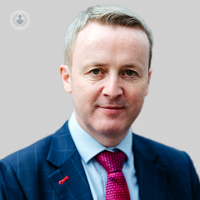How to tackle fatigue
Written in association with:How often do you feel tired? Are you constantly fatigued and feeling burnt out? Believe it or not, a study by Virgin Active has shown that 80 per cent of Londoners feel constantly stressed and exhausted on a daily basis.
Leading London-based consultant rheumatologist Dr Gerald Coakley talks to us about fatigue, chronic fatigue syndrome and when you should visit a fatigue clinic.

What is fatigue?
Fatigue is extremely common but rarely has a serious underlying cause. It’s an overall feeling of tiredness or lack of energy. Often it’s caused by a lack of sleep, chronic stress in the workplace or at home, or even inadequate nutrition. Sometimes people find it difficult to recognise the underlying cause themselves.
How can fatigue be managed?
Most people can self-manage fatigue by:
- Finding a healthy work-life balance - take your holidays!
- Following a nutritious, balanced diet
- Exercising regularly
- Practising relaxation techniques
Those who are sleeping very poorly or not getting a sufficient amount of sleep can be helped with advice to tackle insomnia. Only a small percentage of people reporting fatigue have a problem so debilitating that it stops them from taking part in sport or from having a normal social life. When symptoms this severe persist for more than a few months, it may signal the presence of chronic fatigue syndrome, which can be so severe that people end up requiring time off work or study.
Chronic fatigue syndrome/Myalgic Encephalomyelitis (ME)
Chronic fatigue syndrome (CFS/ME) is a condition which involves long-term disabling tiredness. Tiredness does not improve after rest and is characteristically worse for a few days after physical or mental exertion. Some prefer the term Myalgic Encephalomyelitis (ME), which translates as “aching muscles with inflammation of the brain and spinal cord”.
On the whole, most doctors prefer not to use the term “ME” because studies have not confirmed the presence of any abnormal inflammation in the central nervous system or muscles, but this is an area of dispute. Some people who suffer from CFS/ME feel that “chronic fatigue syndrome” is a term which does not do justice to the degree of disability they experience from the condition, particularly those at the severe end of the spectrum.
Other possible symptoms of CFS/ME can include:
- Sleeping problems such as sleeping too much or too little
- Cognitive problems - difficulty with memory and concentration
- Headaches or muscle pain
- Heart palpitations
- Dizziness or nausea
Anyone with intrusive chronic fatigue should seek a rapid diagnosis to exclude any serious medical condition, then find the right specialist or group of specialists to help them tackle their fatigue.
What causes CFS/ME?
The honest answer is we don’t know, and there may be several or many causes. CFS/ME can be caused by a viral or bacterial illness. On average, adults experience three viral upper respiratory infections per year and mostly recover quickly. However, if we are under stress, perhaps because of a difficult work environment or tensions at home, this impairs the body’s ability to heal and can result in persistent, severe fatigue. There may be genetic factors too. In many people, there is no obvious cause.
How is CFS/ME treated?
There is no treatment that works for everyone, but most can be helped to cope with their symptoms better, and many recover to a large extent. The first thing to do is to work out how to pace the day to cope with the reduced level of energy, so that there is a similar gentle routine every day, with set times for sleeping, being awake, and activity. This may involve reducing work hours for a period.
Once some stability has been established, there is good evidence that cognitive behavioural therapy can help to establish a better sleeping pattern, as well as help with the stress of the condition. Mindfulness meditation can help.
People should aim to wake up and go to sleep at the same time every night and avoid screen time at least one hour before bed. Rest, relaxation and proper nutrition are all vital to battle the symptoms of CFS/ME.
If you suffer from a persistent fatigue problem not helped by rest and would like to overcome it, visit The Fatigue Clinic to find out more about Dr Gerald Coakley, and arrange an appointment with him via his Top Doctors profile.



